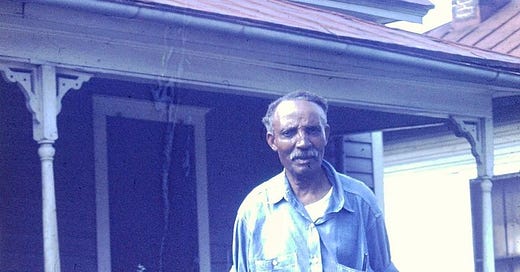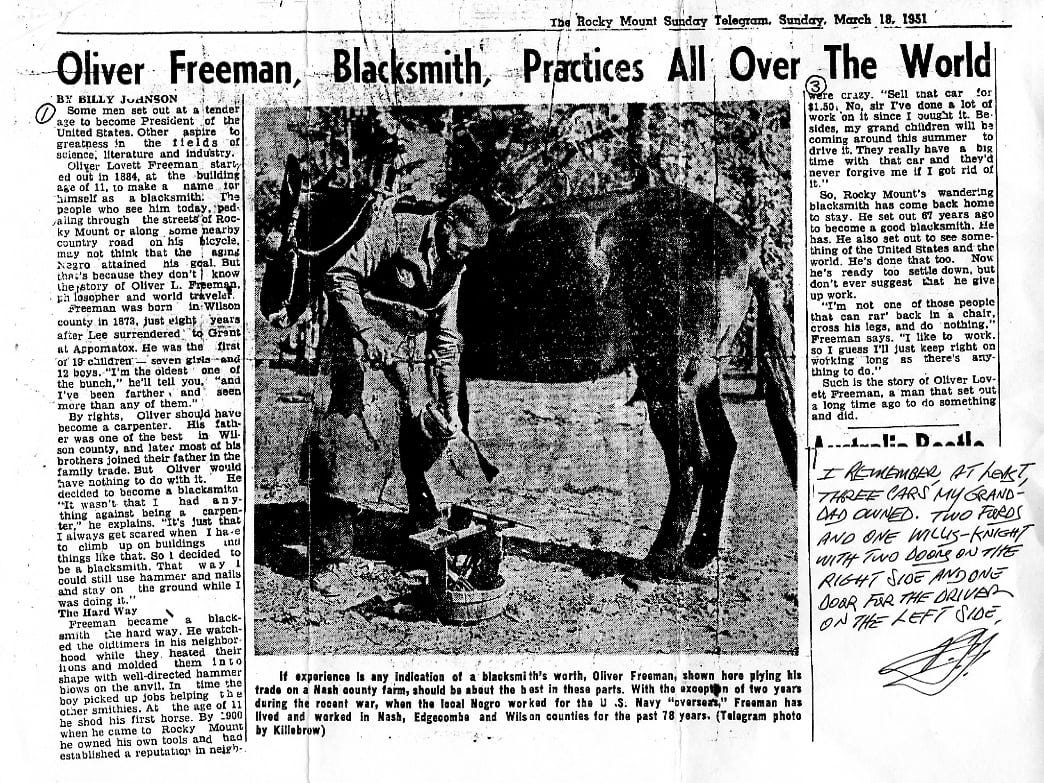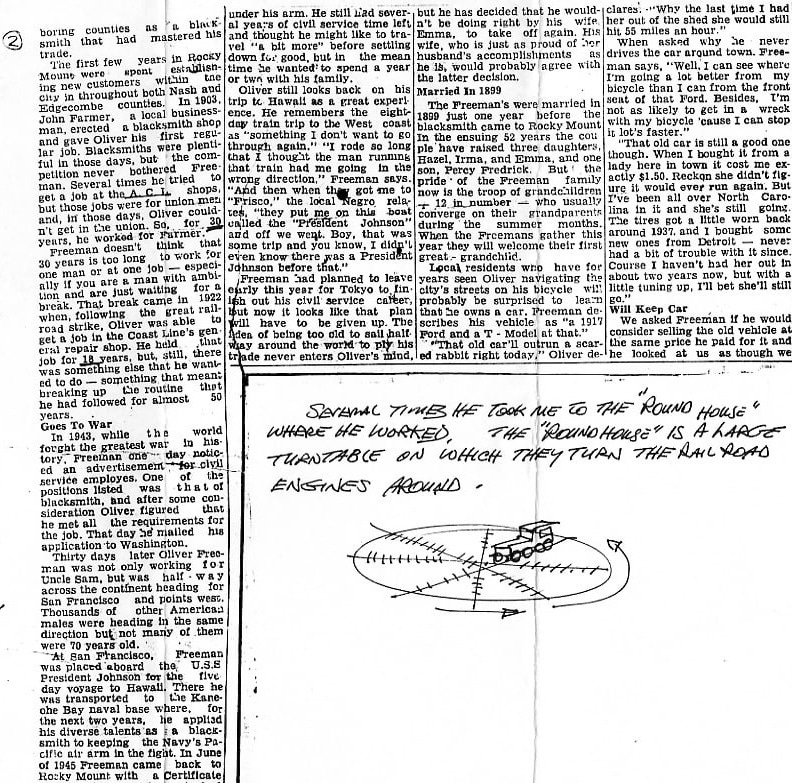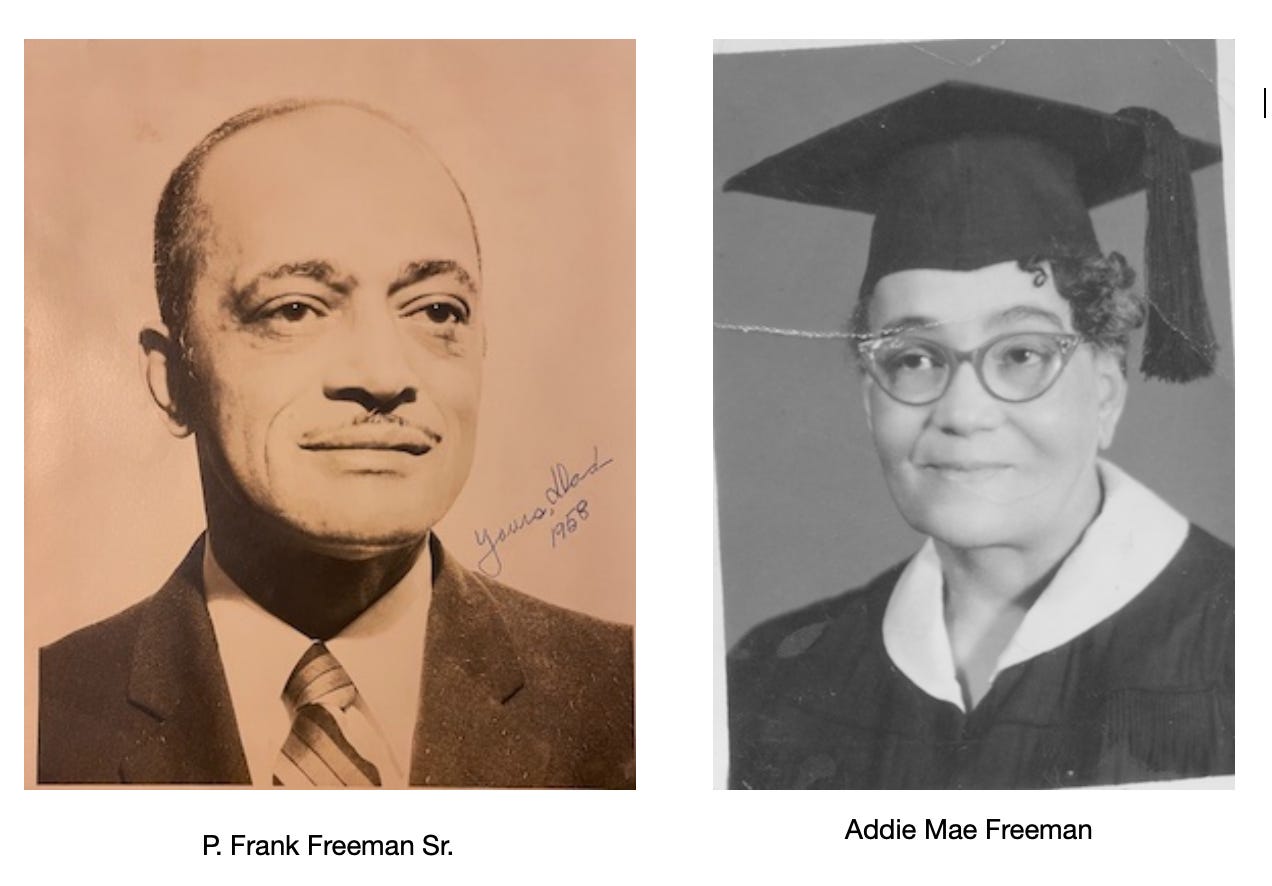My father (P. Frank Sr.) never talked much about his grandmother Emma; it was Oliver (PawFee, as my dad called his grandfather) whose story was so fascinating. Born in 1873 to formerly enslaved people Julius and Eliza of Johnson County, North Carolina, eight years following the surrender of General Lee at Appomattox, he was the oldest of 19 children —12 boys and seven girls. Julius took the name Freeman because, after emancipation, he declared he was a Freed Man, unlike Addie Mae’s grandfather, Monroe, who took the surname Cade. After all, he was born on the Cade Plantation in Louisiana.
Oliver was supposed to follow his father into the carpentry business, but instead, he became a blacksmith, whereby he could still use a hammer and nails. He learned the trade while watching “old-timer” blacksmiths around the neighborhood, shodding his first horse at age 11.
Oliver married Emma Pender in 1899. They had three daughters, Irma, Hazel, and Emma, and one son, Percy Frederick (born 1901). Family legend says the two of them went to Cleveland, Ohio, for their honeymoon, but Emma refused to go unless escorted by her sister, my father’s Aunt Ollie.
At the age of 27, Oliver and Emma moved to Rocky Mount, North Carolina. There, he tried to get a job with the A.C.LR. (Atlantic Coast Line Railroad) shops, but those jobs were for union people, and Oliver could never break into that market until a strike occurred in 1922.
Not sure how Oliver’s son, my paternal grandfather, ended up being born (1901) in Cleveland, Ohio. It may have been that healthcare was better there than what could be found for a Black family in Rocky Mount, NC, or it might have been that Emma’s family lived in Cleveland, and she was sent there to give birth. After all, North Carolina at the time was impacted by Jim Crow Laws that mandated separate facilities for Blacks and Whites. Medical care for Black families was not as robust as they were for White families.
However, in 1903, a local businessman named John established a blacksmith shop and gave Oliver his first steady blacksmith job. Oliver worked for John for the next 20 years. His big break came in 1922 when a railroad strike provided an opening in the Atlantic Coast Line general repair shop. “A white man named Mr. Gardner got that blacksmith job for him.” Oliver made heavy iron parts for trains. This was unique because he was the only black guy in such a position. Most blacks were either porters or firemen stoking the engines.
Several times, he took my father P. Frank Jr. to “… see the big engines being worked on in the roundhouse. A roundhouse is a large train turntable which switched the engines into their stalls to be worked on.” “After the blacksmith job played out, Oliver made his living transporting Blacks to Washington D.C. every weekend in either his Willis Knight or Model “A” Ford. He would take at least two carloads of black men from Rocky Mount to Washington, D.C. These people were trying to escape the harsh segregation of the South. Washington, D.C. was better, but not much better.”
Addie Mae’s father sent her and her sister Wilhelmina to Tuskegee Normal School in Alabama for their education; Oliver sent his son, Percy Frederick, to Tuskegee Normal School to study and train as an electrician. The two met at the school and, upon graduating, got married in February 1921 in Beaumont, Texas, where they lived with Addie Mae’s family. In November of that year, the young couple’s first child was born, my father P. Frank Freeman Jr., and eight months later, the young Freeman family packed their belongings and made their way to Rochester, New York.
Rochester was a great place to be raised, with no noticeable segregation “…except if your parents wanted a job.” There were very few opportunities for people of color to earn a livelihood. Although P. Frank Sr. and Addie Mae were highly educated, he could not get a job as an electrician, nor could she as a teacher. In fact, “…there was no way they were going to let a trained Black teacher teach, even if she looked white.” So P. Frank Sr. took a job as a chauffeur, and Addie Mae took in ironing “…to make ends meet.”
It was during the depression, and if there were any jobs available, they certainly were not going to get one, especially if you were Black, unless it was as a servant.” One of the families Addie Mae did ironing for during the depression would drive her home from ironing, but she was required to sit in the back of his car: “…not good enough to sit in front with him. My dad hated that bastard ever since and was delighted to learn he had lost his money in the stock market when it crashed,”
Rochester was noted for having been a central terminal for the Underground Railroad, helping Blacks escaping slavery to continue their journey to Canada. As a matter of interest, P. Frank Jr. passed the home of Fredrick Douglas, an escaped slave who became a famous abolitionist, on his way back and forth from home to school. Speaking of school, he said he had excellent white teachers who took a personal interest in getting him educated and had many friends of all races. However, he did tell me the story of the “Black Cat Costume.” His Aunt Hazel made a Black Cat Costume for him to wear during a Halloween play, which was also for trick-or-treating, but the teacher never returned the costume to him after the play. That upset him that he had no costume to wear on Halloween night.
Like many kids growing up, there were times when the Bully had to be taught a lesson. In my dad’s case, his nemesis was a boy named Willie. Now Willie lived around the corner from their Atlantic Ave home and would often sic his dog on my dad, but one day instead of sicing the dog on him, he decided he wanted to fight. Well, Willie beat the crap out of my dad, who then ran home only to encounter his father. Well his dad told him to get himself back out there and “Fight like a man,” and if he didn’t go back out there and fight, then his dad would give him a “spanking too”. Well, those words put fear into my dad, and out he ran, catching Willie by surprise in the middle of the street, throwing him to the ground, sitting on him, and beating him up. Does the ‘Christmas Story’ scene come to mind where the schoolyard bully was beaten up in this manner 🙂?
Despite the incidences with Willie, my dad was somewhat jealous of Willie because, from his kitchen window, Willie’s family could be seen eating their dinner at night. This was one event my father wished he could do, but his mother would never allow that. However, my father was saddened to learn that one day, Willie and his father hung themselves in the basement of their home.
When P. Frank Jr. was about 11 years of age, “…his aunt Rosie (Grandma Emma’s sister) came to live with the family. She had been burned out of her farm by the Ku Klux Klan. So you see, even in a northern liberal city like Rochester, N.Y., hate had penetrated.”
My father said his dad was a great guy who taught him to be a man, and if he were going to get along in the U.S. of A., he would have to keep his “nose clean” and to be twice as “good to get half as far.” He used to tell him, “If you are going to be a crook, be the best crook you can be, but being honest is better.” He taught him how to work and persevere, dress well, and be proud of himself and his family.
In college P. Frank Sr. was in the band where he played the flute, piccolo, and saxophone. One of his favorite songs to play was “When the War Breaks Out in Mexico, I’m going to Montreal..”
A number of times, the two of them would go fishing under one of the railroad trusses, where the water was clear and calm and full of fish, but the only catch was minnows. Or the time they went fishing in a rowboat, and only my dad would catch fish. Besides fishing, his dad liked to hunt ducks and pheasants.
As mentioned earlier, P. Frank Sr. “…chauffeured in Rochester because jobs were not available for skilled black people, but one of the families that employed him was Dr. and Mrs. Jewett. Whenever he returned from a chauffeuring trip for Dr. Jewett, he would bring home sandwiches, bananas, oranges, filet mignon, etc. After chauffeuring for Dr. and Mrs. Jewett for some time, Mrs. Jewett learned that P. Frank Sr. graduated from Tuskegee but could not get a job as an electrician. So she, being a wonderful and very influential person with many big shots, got [him] a job at Simeton-Goul. And when that job played out, she got him a job at Strongberg-Carlton.
“When P. Frank Sr. got laid off from Strongberg, he decided to go to Detroit and look for work. While he was out looking for a job, he worked out an agreement with Dr. and Mrs. Jewett that while he was looking for a job, his family would move into one of the Jewett’s homes and would be charged no rent, except my dad would have to stop by every day after school wash the car, bring up the firewood from the basement, and help the maids with any assignments they would give him. Soon, the family got news that P. Frank Sr. had secured a job at the Ford Motor Company as an electrician, with a fabulous income of $0.35 ($6.59 in 2024) per hour. And he was coming back to Rochester to get his family.”
“Well, Man! When [the family] got to Detroit, that [was] the first time [P. Frank Jr.] had seen a real ghetto! Some alleyways were piled with trash and garbage 6 feet high for blocks and blocks. P. Frank Sr. got [his family] out of that mess as soon as possible! After a short time [P. Frank Jr.’s] parents found a two-story house (no longer in existence) on a quiet street with beautiful trees and a large backyard.”
Once the family settled in, P. Frank Jr. was selected to attend Cass Technical High School, “…which was noted as one of the best high schools in America.” Charles Lindbergh's mother, Evangeline Lindbergh, taught chemistry at Cass from 1922 until 1942. Notable students from Cass High School included Lily Tomlin, Diana Ross, Della Reese, Ellen Burstyn, Kenya Summer Moore, John DeLorean, developer of the DeLorean Automobile, and World War II Medal of Honor recipient Major Charles Leroy Thomas, to name just a few of the distinguished graduates. Major Thomas appeared to have attended Cass High School and worked at the Ford Motor Company as a molder at the same time P. Frank Jr attended Cass High School and worked in the “Dynamotor Laboratory” at the Ford Motor Company.
While at Cass High School, his primary focus was studying art. His grandfather (Oliver Lovette), whose brother, Uncle Dan, influenced him to become an artist. Whenever Uncle Dan visited and opened his traveling trunk, a big, beautiful black and yellow tiger painting stared back at him. It was so beautiful and realistic that his goal was to become an artist like his uncle Dan. Upon graduating from high school, P. Frank Sr. introduced his son to Mr. Anderson, “…who had some influence with the Ford Motor Company.” Mr. Anderson arranged for my dad to take a test, which he passed with high marks. Consequently, he “..was accepted into the Ford Motor Company apprentice school.” While taking night classes at Lawrence Technical School, “[he] worked four hours a day in the Dynamotor Laboratory and two hours a day drawing in the engineering department doing drafting.”
Working for the Ford Motor Company provided him with great experience, especially working with such a dynamically interesting group of people. For example, Mr. Johnson, P. Frank’s boss, “..was one of the guys you could not tell if he was Black or White. He never smiled (except one time.) [He] was intimidated by his presence, and so were the other employees…. [P. Frank Jr.] was the only kid in that office. The one time Mr. Johnson smiled was the time [P. Frank Jr.] thought [he] was going to be fired. The dynamotor laboratory was the unit that tested and experimented with engines. So they had this engine on a stand and had it running day and night, non-stop, for about 820 hours (about 35 days.) During this time, they had been taking readings from a big instrument panel connected to the engine.”
“So David, one of the technicians, shut down the engine and took it apart. Made some more readings with the engine apart. Then told [P. Frank Jr.] to put the engine back together so […more testing could be done.] This was accomplished, except the last nut… was [accidentally] dropped into the engine, down the spark plug hole. Now, a traumatic decision needed to be made.” “Should [he] announce that a ‘major goof’ had been made which would screw up the experiment or should nothing be said …in which case the engine would surely blow up. The correct decision was made, and Mr. Johnson …thought the predicament was funny and joked about it with the other employees. And, that was the only time Mr. Johnson smiled.”
While working and training with the Ford Motor Company, WWll broke out, and soon P. Frank Jr. found himself drafted into the U.S. Army
Next episode: Rocky Mount, NC
As it turned out I was the first great-grandchild as per the above article.
https://historicdetroit.org/buildings/cass-tech-high-school-old
https://www.telllegacy.com/tell-legacies/2022/4/25/a-legacy-of-place-cass-technical-high-school







